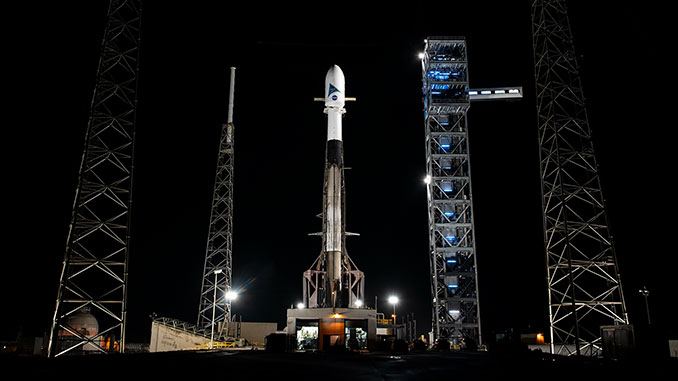
Update 9:55 p.m. EST: SpaceX and NASA scrubbed the launch due to poor weather.
午後9時55分更新EST: SpaceXとNASAは悪天候のため打ち上げを中止した。
SpaceX is preparing to launch its second NASA mission of the year on Wednesday morning. A Falcon 9 rocket carrying the Earth-observing spacecraft PACE (Plankton, Aerosol, Cloud, ocean Ecosystem) was set to liftoff Tuesday morning, but teams had to stand down due to poor weather.
SpaceXは水曜日の朝に今年2回目のNASAミッションを打ち上げる準備をしている。地球観測宇宙船PACE(プランクトン、エアロゾル、雲、海洋生態系)を搭載したファルコン9ロケットは火曜日の朝に打ち上げられる予定だったが、悪天候のためチームは中止しなければならなかった。
Teams from NASA, SpaceX and Space Launch Delta 45 (SLD45) are now aiming for the 24-hour backup opportunity: a 1:33 a.m. EST (0633 UTC) liftoff from Space Launch Complex 40 (SLC-40) at Cape Canaveral Space Force Station on Feb. 7.
NASA、SpaceX、Space Launch Delta 45 (SLD45) のチームは現在、24 時間のバックアップの機会、つまりケープカナベラル宇宙軍の Space Launch Complex 40 (SLC-40) から東部時間午前 1 時 33 分 (UTC 0633) に打ち上げられることを目指しています。 2月7日の駅。
This will be the eighth launch from Florida in 2024 and the seventh for SpaceX from the Space Coast this year. Spaceflight Now will have live coverage of the mission beginning at 11:30 p.m. EST (0430 UTC).
これは2024年にフロリダから8回目の打ち上げとなり、スペースXにとっては今年スペースコーストから7回目となる。 Spaceflight Now では、午後 11 時 30 分からミッションのライブ中継が行われます。東部標準時 (0430 UTC)。
The PACE launch will be the first time a U.S. government mission has targeted a polar orbit from Cape Canaveral in more than 60 years. Polar flights were suspended after a cow in Cuba was killed by falling debris from a failed launch in 1960, sparking protests in Havana.
PACEの打ち上げは、米国政府のミッションがケープカナベラルからの極軌道を目標とするのは60年以上で初めてとなる。 1960年にキューバで打ち上げ失敗による落下破片で牛が死亡し、ハバナで抗議活動が勃発したことを受けて、極地飛行は中断された。
“At that point, we as a government decided, let’s just take all our polar launch missions to the West and we’ve successfully launched into the polar orbit hundreds of times since the 60s from Vandenberg Space Force Base in California,” said Tim Dunn, the senior launch director for NASA’s Launch Services Program.
「その時点で、私たちは政府として、すべての極地打ち上げミッションを西側に持って行こうと決心し、カリフォルニアのヴァンデンバーグ宇宙軍基地から60年代以来何百回も極軌道への打ち上げに成功してきました」とティム・ダン氏は語った。 、NASAの打ち上げサービスプログラムのシニア打ち上げディレクター。
SpaceX resumed launches from the Cape on southerly trajectories in 2020. The company has successfully flown 11 missions into polar orbit from the Florida spaceport without incident.
スペースXは2020年にケープから南向きの軌道で打ち上げを再開した。同社はフロリダ宇宙港から11回のミッションを無事に極軌道に打ち上げることに成功した。
“Along comes SpaceX a handful of years ago with the autonomous flight safety system and the ability to either bring the first stage booster back to land here at the Cape or land on a droneship off-shore,” Dunn said. “And by a combination of those two things, we were able to then do all of the calculations to protect the public, both here in the U.S. as well as our international neighbors in the Caribbean and especially in Cuba and to get the numbers right where we can now successfully do that.”
「スペースX社は数年前、自律飛行安全システムと、第1段ブースターをここ岬に着陸させるか、沖合のドローン船に着陸させる機能を搭載した」とダン氏は語った。 「そして、これら 2 つのことを組み合わせることで、ここ米国だけでなく、カリブ海諸国、特にキューバの国際的な近隣諸国の両方で、国民を守るためのすべての計算を行うことができ、正しい数字を得ることができました。」今ではそれがうまくできるようになりました。」
The Falcon 9 first stage booster supporting this launch, tail number B1081, will be making its fourth flight. It previously launched the Crew-7 quartet to the ISS as well as a Cargo Dragon and a Starlink mission.
この打ち上げをサポートするファルコン 9 の第 1 段ブースター、尾翼番号 B1081 は 4 回目の飛行を行います。以前にはクルー7カルテットのほか、カーゴ・ドラゴンやスターリンクのミッションも打ち上げられた。
Dunn said their consideration for reflights on a booster has less to do with the basic number as much as it has to do with what kinds of missions it has flown to date.
ダン氏は、ブースターでの再飛行についての検討は、基本的な数値とはあまり関係なく、これまでにどのような種類のミッションを飛行したかに関係していると述べた。
“We don’t look at the number of particular flights of a booster. We look at the qualification status of all the components that go into that booster,” Dunn explained. “We do an evaluation and as long as we do not exceed [qualification] status, and some components do get replaced in between flights, and then we do analysis on some of the structures that are not replaced, we’re comfortable.”
「ブースターの特定の飛行回数は考慮しません。私たちはそのブースターに組み込まれるすべてのコンポーネントの認定ステータスを調べます」とダン氏は説明しました。 「私たちは評価を行い、(適格な)ステータスを超えない限り、いくつかのコンポーネントはフライトの間に交換され、その後、交換されなかった構造の一部について分析を行います。」
NASA’s Europa Clipper will be the first time the agency will rely upon boosters that have flown five previous missions. Those Falcon Heavy side boosters most recently supported the launch of NASA’s Psyche spacecraft.
NASA のヨーロッパ クリッパーは、NASA が過去 5 回のミッションを飛行したブースターに初めて依存することになります。これらのファルコン ヘビーのサイド ブースターは、最近では NASA のサイケ宇宙船の打ち上げをサポートしました。
Following stage separation, the booster will flip to return for a landing at Landing Zone 1 (LZ-1) at the Cape about 7.5 minutes after liftoff. This will be its third LZ-1 landing out of four flights.
ステージ分離後、ブースターは反転して、打ち上げから約 7.5 分後にケープの着陸ゾーン 1 (LZ-1) に着陸するために戻ります。 LZ-1の着陸は4回の飛行のうち3回目となる。
This landing will mark the 36th for LZ-1 and the 45th in Florida. Assuming SpaceX doesn’t squeeze in a Starlink launch from VSFB on Monday night and that the PACE mission is successful, this will be the company’s 270th booster landing to date.
今回の着陸は、LZ-1にとっては36回目、フロリダでは45回目となる。スペースXが月曜夜にVSFBからのスターリンク打ち上げを予定しておらず、PACEミッションが成功すると仮定すると、これは同社にとってこれまでで270回目のブースター着陸となる。
The total cost of the mission, between building the spacecraft, the launch operations and the mission support once on orbit, is $948 million, according to Dunn. For the launch services of the Falcon 9 rocket, NASA paid SpaceX about $81 million.
ダン氏によると、宇宙船の製造から打ち上げ作業、軌道上でのミッション支援までを含めたミッションの総費用は9億4,800万ドルだという。ファルコン9ロケットの打ち上げサービスのために、NASAはスペースXに約8,100万ドルを支払った。
Dunn said they are using new payload fairings on this flight, but are evaluating that possibility for the future.
ダン氏は、今回の飛行では新しいペイロードフェアリングを使用しているが、将来に向けてその可能性を評価していると述べた。
“We are under evaluation with SpaceX right now and I would anticipate that to happen in the next year-and-a-half or two,” Dunn said. “We’ll see how that goes for the fairing.”
「私たちは現在スペースX社と評価中ですが、それは今後1年半か2年以内に実現すると予想しています」とダン氏は語った。 「フェアリングがどうなるか見てみましょう。」
Weather concerns for atmosphere observing mission
As the launch teams were heading towards the launch window overnight, weather remained a watch item. During a prelaunch briefing with press, Brian Cizek, a launch weather officer with the 45th Weather Squadron for the U.S. Space Force, said the probability of violating weather was 60 percent for the Tuesday morning launch opportunity.
大気観測ミッションにおける天候の懸念 打ち上げチームが夜通し打ち上げ窓に向かっていたとき、天候は依然として警戒事項であった。米宇宙軍第45気象飛行隊の打ち上げ気象担当官であるブライアン・シゼック氏は、記者団との打ち上げ前の会見で、火曜午前の打ち上げ機会において天候に違反する確率は60パーセントであると述べた。
“We’re going to see this wind surge kind of come down the Florida coast from north to south. That’s also going to bring some additional moisture into the air,” Cizek said. “So, a few concerns with the launch tonight due to that.”
「この突風がフロリダの海岸を北から南へ下っていくようなものになるでしょう。これにより、空気中にさらに湿気が含まれることになります」とチゼク氏は語った。 「そのため、今夜の発売にはいくつかの懸念があります。」
Cizek said the liftoff winds would be “getting close to the limits” around launch time with the winds “increasing as the night progresses.” He said those winds will decrease by Tuesday night, which is partly why the launch forecast improves to only 40 percent chance of violating weather on Wednesday morning.
チゼク氏は、打ち上げの頃には打ち上げ風が「限界に近づき」、風は「夜が進むにつれて強まる」だろうと述べた。同氏は、こうした風は火曜の夜までに弱まるだろうと述べ、これが水曜朝の打ち上げ予想が天候に反する可能性がわずか40パーセントに改善する理由の一部であると述べた。
He also said forecasters with SLD45 also have concerns about showers along the coastline creating a violation of the cumulus cloud rule. The corresponding clouds also bring the thick cloud layers rule into play for this first launch opportunity as well.
同氏はまた、SLD45の予報担当者らも海岸線に沿ったにわか雨が積雲ルール違反を引き起こすことを懸念していると述べた。対応する雲は、この最初の打ち上げの機会にも厚い雲層のルールを適用します。
“The thing for the backup day, the major concern will again be the liftoff winds. We said they kind of peak during the morning and early afternoon on Tuesday and then when they do begin to decrease again as we head into Tuesday evening,” Cizek said. “And then the weather just continues to improve as we get beyond that.”
「予備日のことだが、最大の懸念はやはり打ち上げ風だろう。私たちは、火曜日の午前中と午後の早い時間帯にピークがあり、その後火曜日の夕方に向けて再び減少し始めると言いました」とチゼク氏は語った。 「そして、それを越えるにつれて天気は回復し続けます。」
Expanding ocean and atmosphere understanding
The PACE mission is designed to last three years nominally, but carries enough fuel to support a 10-year mission. NASA will reevaluate things about every three years to determine if they are able to and desire to extend the mission.
海洋と大気への理解の拡大 PACE ミッションは名目上 3 年間持続するように設計されていますが、10 年間のミッションをサポートするのに十分な燃料を搭載しています。 NASAは、ミッションを延長することが可能かどうか、また延長したいかどうかを判断するために、約3年ごとに物事を再評価する予定です。
The goal of the Earth-observing spacecraft will be to increase our understanding of the interplay of the oceans and the atmosphere through the lens of some of the tiniest parts of each: phytoplankton and aerosols.
この地球観測探査機の目標は、海洋と大気の最も小さな部分である植物プランクトンとエアロゾルのレンズを通して、海洋と大気の相互作用についての理解を深めることです。
“These micro-algae that are at the base of the marine food chain, they serve our fisheries and serve the health of the oceans, but they can also be toxic and we need to know that too,” said Karen St. Germain, the director of NASA’s Earth Science Division. “They’re also responsible, through photosynthesis, for absorbing a tremendous amount of carbon dioxide and converting that into oxygen in the atmosphere.”
「これらの微細藻類は海洋食物連鎖の根幹にあり、私たちの漁業に貢献し、海の健康に貢献しますが、有毒である可能性もあり、それについても知る必要があります」と、カレン・セント・ジャーメイン氏は述べた。 NASAの地球科学部門のディレクター。 「彼らは光合成を通じて、膨大な量の二酸化炭素を吸収し、それを大気中の酸素に変換する役割も担っています。」
“We’re also looking at tiny things in the atmosphere. These are called aerosols. they’re tiny particles that play an enormous role in our weather, our air quality and even our climate,” she added. “They come from sources like dust flowing off the Sahara, wildfires and even human activities. They seed clouds that can grow into hurricanes coming across the Atlantic, but they also reflect a lot of the Sun’s energy. So, they play an important role in the long-term stability of Earth’s climate.”
「私たちは大気中の小さなものにも注目しています。これらはエアロゾルと呼ばれます。それらは私たちの天気、大気の質、さらには気候に大きな影響を与える小さな粒子です」と彼女は付け加えた。 「それらは、サハラ砂漠から流れる塵、山火事、さらには人間の活動などの発生源からもたらされます。それらは大西洋を横断するハリケーンに成長する可能性のある雲の種を作りますが、太陽のエネルギーの多くを反射することもあります。したがって、それらは地球の気候の長期的な安定に重要な役割を果たしています。」
St. Germain said the mission builds on both 20 years of NASA’s work observing the oceans and more than 60 years of overall NASA Earth observation. She noted that understanding these systems and their interplay is not only important for advancing scientific understanding, but it also has a big role for the U.S. economy.
サン・ジャーメイン氏は、このミッションはNASAの20年にわたる海洋観察活動と、60年以上にわたるNASA全体の地球観察の両方に基づいていると述べた。彼女は、これらのシステムとその相互作用を理解することは、科学的理解を進めるために重要であるだけでなく、米国経済にとっても大きな役割があると指摘しました。
“The ocean economy makes up over $350 billion of our gross domestic product per year. It employs 3.1 million people in our country, but it can also experience adverse impacts from things like harmful algal blooms, which can cost $50 million a year or more,” St. Germain said. “So, the work we’re doing with PACE and the work we do in Earth Science is about making observations to help us understand the Earth System, capturing that understanding in models and predictive tools and putting that information into the hands of people who can use it to make better decisions every day.”
「海洋経済は年間国内総生産の3,500億ドル以上を占めています。我が国では310万人が雇用されていますが、有害な藻類の発生などによる悪影響も受け、年間5,000万ドル以上の費用がかかる可能性があります」とサンジェルマン氏は述べた。 「したがって、私たちがPACEで行っている仕事と地球科学で行っている仕事は、地球システムを理解するのに役立つ観察を行い、その理解をモデルや予測ツールに取り込み、その情報をそれができる人々の手に渡すことです。毎日より良い意思決定をするためにそれを活用してください。」


 Optimisus
Optimisus DogeHome
DogeHome Crypto News Land
Crypto News Land Optimisus
Optimisus Crypto News Land
Crypto News Land Crypto News Land
Crypto News Land Optimisus
Optimisus Cryptopolitan_News
Cryptopolitan_News






















